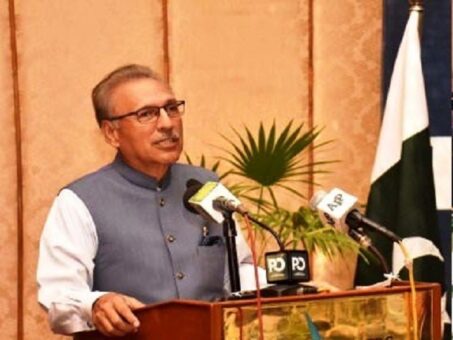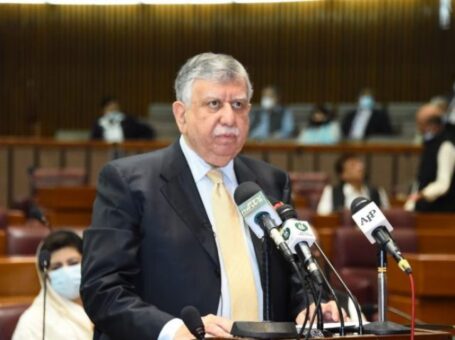ISLAMABAD: The Federal Board of Revenue (FBR) has invited applications for 952 vacant posts for up to BS-14 in Pakistan Customs across the country.
The last date for submission of applications is February 26, 2022.
According to the FBR, applications have been invited for about 73 vacant posits in Directorate General of Transit Trade, Karachi. These included: Data entry operators (DEO) (BPS-14), three vacancies; sepoy (BS-05), 63 vacancies; and driver (BS-04), seven vacancies.
For vacant posts in Directorate of Transit Trade, Peshawar, the FBR invited applications for 23 posits, which included: DEO BS-14, two vacancies; sepoy BS-05, 48 vacancies; and driver BS-04, three vacancies.
READ MORE: Customs to auction huge lot of motor vehicles on Feb 15
The FBR announced 79 vacant posts at Directorate of Transit Trade, Quetta, which included: sepoy BS-05, 76 vacancies; and driver BS-04, three vacancies.
About 52 vacant posts have been announced at the Directorate of Transit Trade, Gwadar, which included: DEO BS-14, one vacancy; sepoy BS-05, 48 vacancies; and driver BS-04, three vacancies.
The applications have been invited for 24 vacant posts at the Directorate of Transit Trade, SOST, which included: DEO BS-14, one vacancy; sepoy BS-05, 22 vacancies; and driver BS-04, one vacancy.
The FBR invited applications for 58 vacant posts in the Directorate of Transit Trade, Lahore, which included: DEO BS-14, one vacancy; sepoy BS-05, 54 vacancies; and driver BS-04, three vacancies.
The applications have been invited for 347 vacant posts at the Collectorate of Customs Enforcement, Peshawar, which included: sepoy BS-05, 346 vacant posts; and driver BS-04, one vacancy.
About 153 vacant posts are created at the Collectorate of Customs Enforcement, Quetta, which included; sepoy BS-05, 150 vacant posts; and driver BS-04, 03 vacant posts.
READ MORE: Customs I&I Multan to auction vehicles on February 09
The FBR invited applications for 50 vacant posts of sepoy BS-05 at the Collectorate of Customs, Gwadar.
Similarly, applications have been invited for 20 vacant posts of sepoy BS-05 at the Collectorate of Customs Enforcement, Multan.
The FBR invited applications for 15 vacant posts of sepoy BS-05 at the Directorate of Intelligence and Investigation-Customs, Quetta.
For Directorate of Intelligence and Investigation-Customs, Multan, applications have been invited for 05 vacant posts of sepoy BS-05.
The applications have been invited for 20 vacant posts of sepoty BS-05 in the Directorate of Intelligence and Investigation-Customs, Peshawar.
One vacant post of DEO-BS-14 is at Directorate of Law and Prosecution, Lahore.
Another one vacant post of DEO-BS-14 is at Directorate of Law and Prosecution, Peshawar.
Likewise, one vacant post of DEO-BS-14 is at Directorate of Law and Prosecution, Quetta.
REQUIRED QUALIFICATIONS, EXPERIENCE, AGE LIMIT FOR THE ADVERTISED POSTS:
| S.# | Name of Post | Qualification/Experience | Age limit (including 5 years general relaxation) |
| 1 | Data Entry Operator (BPS-14) | i. 2nd Class or Grade “C” Bachelor’s Degree with Computer Science/ Physics/ Mathematics/ Statistics/ Economics from a recognized University. ii. Speed of 10,000 key depressions per hour on computer. | 18-30 |
| 2 | Sepoy (BPS-05) | Matric. Physical standard: (Male: Height 5’.6”, Chest 32” with expansion of 1.5”), (Female: Height 5’.2”). | 18-30 |
| 3 | Driver (BPS-04) | i. Primary. ii. Valid driving license holder and well versed in the traffic rules. | 18-35 |
GENERAL INFORMATION / INSTRUCTIONS:
1. The eligible candidates are advised to apply online through National Job Portal Link https://njp.gov.pk . Candidates applying for more than one post should apply online separately for that post.
2. The candidates having domiciles of the relevant Region/ Province/ District under the jurisdiction of each Customs Collectorate/ Directorate (as mentioned in the column of Provincial / Regional Quota under the name of each Field Office) are eligible to apply against the posts vacant in the desired Field Offices. Both male and female candidates are eligible.
3. Candidates will be required to bring Original Documents and two (02) set of attested copies of document at the time of interview.
READ MORE: FBR exempts customs, regulatory duty on Afghan goods
4. Skill test will be conducted for the post of DEO and Driver.
5. Physical standard (Height & Chest measurement alongwith any other physical tests that the Recruitment Committee deems necessary i.e. Running, Pushups, Chinups etc.) for the posts of Sepoy will be conducted for pre-screening of the candidates. Female candidates will also have to undergo Physical Standard (Height and other aforementioned test). In running test, male candidates will have to cover one Kilometer distance in 07 minutes while female candidates will have to cover one Kilometer distance in 10 minutes.
6. Only short-listed candidates on the basis of skill tests and physical standard will be called for test / interview. No TA / DA will be admissible for the Test / Interview.
7. 10% quota for Women, 5% quota for Minorities and 2% quota for disabled persons (if applicable) will be observed as per government instructions.
8. The Federal Government reserves the right not to fill any vacancy or to increase or decrease the number of vacancies if the circumstances so warranted.
9. The candidates working in Government / Public Sector Departments / Organizations should apply through proper channel.
10. Five (05) years general relaxation in upper age limit has already been included in the column of Age limit. In addition to the 5 years general age relaxation by the Government, any other age relaxation would be admissible as under:-
| S# | Category of candidates | Age relaxation admissible |
| i) | (a) Candidates belonging to Scheduled Castes, Buddhist Community, recognized tribes of the Ex-FATA/PATA, Azad Kashmir and Gilgit-Baltistan for all posts under the Federal Government. (b) Candidates belonging to Sindh (R) and Balochistan for posts in BPS-15 and below under the Federal Government. | 03 Years 03 years |
| ii) | Released or Retired Officers/ Persons of the Armed Forces of Pakistan. | 15 years or the number of years actually served in the Armed Forces of Pakistan whichever is less. |
| iii) | Government Servants who have completed 02 years continuous Government Service on the closing date of receipt of applications. | 10 Years, up-to the age of 55 years. |
| iv) | Disabled persons for appointment to posts in BPS 15 and below. | 10 years |
| v) | Widow/ Widower, son or daughter of a deceased civil servant who dies during service. | 05 years |
11. Minimum and Maximum age shall be calculated on the closing date for receipt of applications.
12. Information provided while applying online will be verified. In case of any false or forged information, FBR reserves the right to cancel candidature of any person at any stage (even after employment, if so revealed later) and to initiate legal action against the applicant.
13. All candidates will be provisionally allowed to appear in the test/ interview subject to scrutiny of their eligibility after the recruitment process.
For further details download FBR’s official letter of vacant posts.






